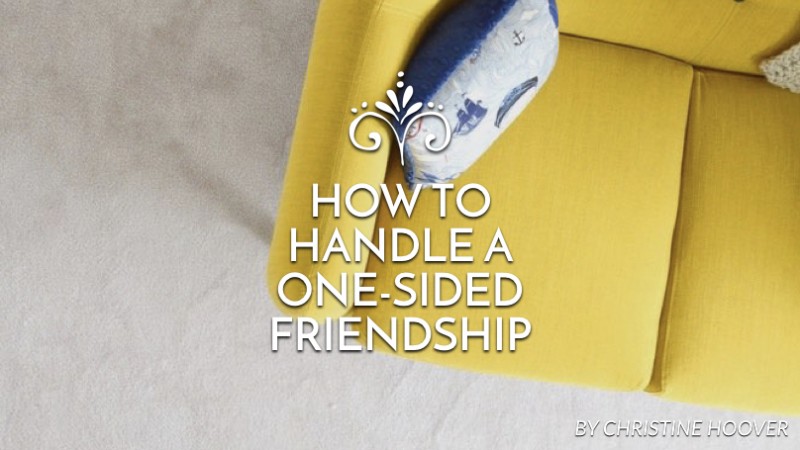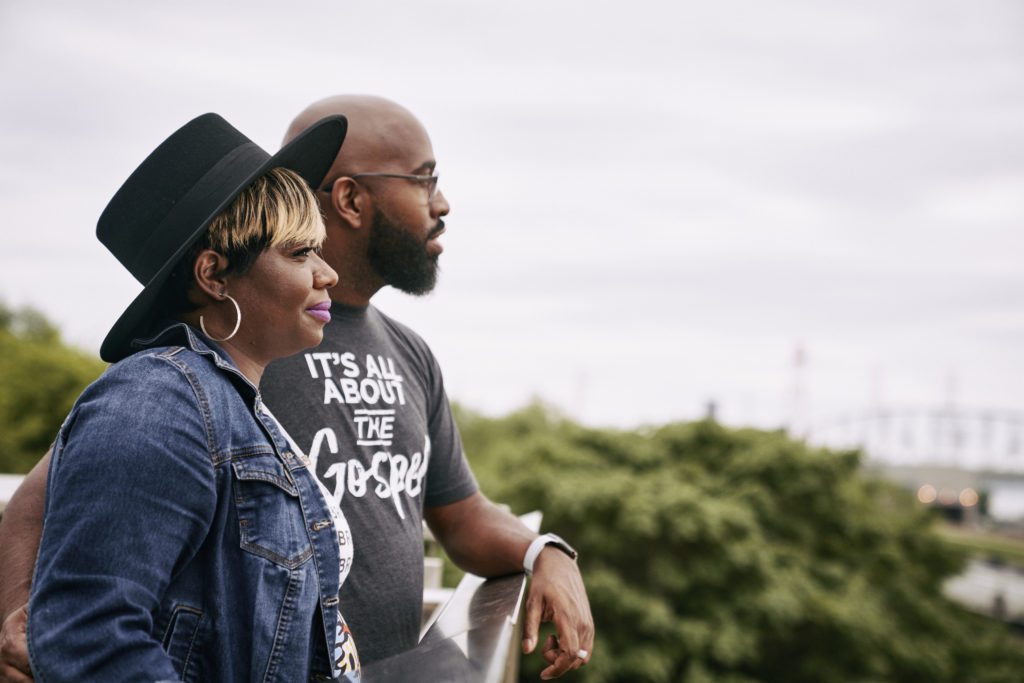I was asked, “Why does friendship at times feel one-sided?” That question, of course, could mean many different things, like, “Why must I do all the work?” “Why is that one person in my life not reciprocating my overtures of friendship?” or “Why is no one reaching out to me or helping me?” But all those questions mask the underlying statement—”I feel invisible.”
I understand the frustration behind it. It’s so disheartening when we make ongoing efforts to extend friendship to other women, and instead are met with what appears to be apathy or, worse, disinterest. Sometimes it’s not even that we feel hurt by one-sided friendship, but, rather, we’ve just grown weary of it—the work and feeling responsible for the health of our relationships.
Believe me, I understand. Simply by marrying a man called to ministry, I’ve been thrust into a wonderful yet weird role that is much more weird than wonderful when it comes to friendships. Everything I’m about to say is matter-of-fact, without complaint but with a full embrace of where God has me … many of my relationships are one-sided. Not all are, but there are many. I say this because I can speak to this. People have a tendency to believe pastors’ wives are surrounded by friends; that pastors’ wives have no trouble in this area. But the truth is, there is much to navigate and one of the toughest areas to navigate is the feeling of being the responsible party in a one-sided relationship. It can be difficult to know with confidence that I am accepted and valued apart from my responsible role, my performance and how I make others feel.
Relationship versus friendship
Now, here’s what I’m learning from those who are not pastor’s wives—it’s no different for them either! Almost all women are navigating multiple one-sided relationships, and this is very much a part of life as a Christian. We are called to love others, serve them and lay our lives down for them. The narrative arc of the New Testament is that the believer is the initiator, constantly moving toward others to meet their needs first. And it can be done! This is done in imitation and honor of Christ, who really knows what one-sided relationships look like. And the only way we can remain un-jaded and un-offended in our relationships is to look to Him for the extent to which He went to prove His love for us. What an encouraging truth to keep putting ourselves out there!
Now, take note that I haven’t been using the word “friendship” but rather the word “relationship.” The majority of our relationships are likely going to be one-sided and sacrificial. Some examples are parenting children, work relationships, blessing our neighbors and serving in the church. However, our friendships should look different in a way. Friendship will never be a 50/50 partnership. Sometimes women, due to stage of life or difficult circumstances, don’t have the capacity to reciprocate friendships in ways we’d prefer. Such circumstances are opportunities to serve our suffering friends during this season; remember they are trying to keep their heads above water and have nothing to offer us in return. Bless them while you are able. Friendship is not about keeping score.
However, friendship is mutual. I’ve thought about this a lot. The mutuality is how we know someone is a friend. In my role as a pastor’s wife, I get to talk with a lot of women, and I absolutely love doing so, but because of this, I’ve also had difficulties at times knowing who my friends actually are and who I can turn to when I need help. I finally realized the distinguishing mark is mutuality. These women don’t have to mirror my every word and action, but there is a genuine returned interest in who I am as a person.
Let’s be honest: for all of us, this is going to be a small list of people. In fact, it may not be a list at all but rather just one person. And that one person is imperfect and will not reciprocate in all the ways we want at all times. I think this is where we often stumble: we think everyone else’s list is really long and everyone is out there doing all the things with all the people and laughing and giggling and having the time of their lives. Everyone else feels accepted and as if they belong, and we’re the losers sitting over in the corner waiting to be noticed. In reality, people are busy and when they hang out together there are a whole lot of acrobatics involved in making it happen. For a friendship to have evolved into a solid and easy place, it’s probably happened through awkwardness and lots of lots of years. We’re all in the same boat, is what I’m saying, pastor’s wife or not, married or single, childless or with child, introvert or extrovert.
What if a friendship is one-sided?
Don’t know what to do? Here’s what I have found works:
- Ask: “Is this a friendship or a relationship?” Either way, as a Christian, I’m called to go toward others with love and acts of service. But, if I’m calling it friendship even though it is consistently not mutual, I may need to release some expectations of that person and of myself. It might be more of a relationship than a friendship.
- Remember, mutual friendships are gems. They’re rare and often hidden. Sometimes, while looking for friends, I go back to the same place over and over again. I may need to expand my horizons and mine different places—women in different ages and stages of life, for example.
- Look for what is given rather than for what is not. Sometimes I leave a conversation frustrated at how one-sided it was, and I can start down a rabbit-trail of self-pity and resentment. I’ve learned to stop and consider what in the conversation blessed me. Perhaps she entrusted me with part of her story or paid for my coffee. She may not have asked me a question (my love language, by the way), but she probably showed some form of love and friendship in her own way. I just have to slow down and look for those small acts, then thank God for them. Having a gracious spirit rather than a critical one (knowing God’s love toward me has helped change my own heart) toward other women goes a long way. Only then can we appreciate and receive small acts of friendship as gifts rather than becoming demanding, having unrealistic expectations or keeping friendship score. Other women can sense these unspoken demands and will back off. Then, we’re really in for some one-sided relationships.
- Consider if needs are known to others. I am the queen of being hard to know (my Myers Briggs profile says that I am a mystery even to myself. Ha!) and I very much resist asking for help. I’ve found that some friendships feel one-sided because I’ve expected others to just know what I want or need. What I need to remember is that I may not have even given people the opportunity to reciprocate. They may not have known what I wanted or needed!
What about you? How would you answer this question? What has helped you navigate relationships or friendships that feel one-sided?
Published December 1, 2016



